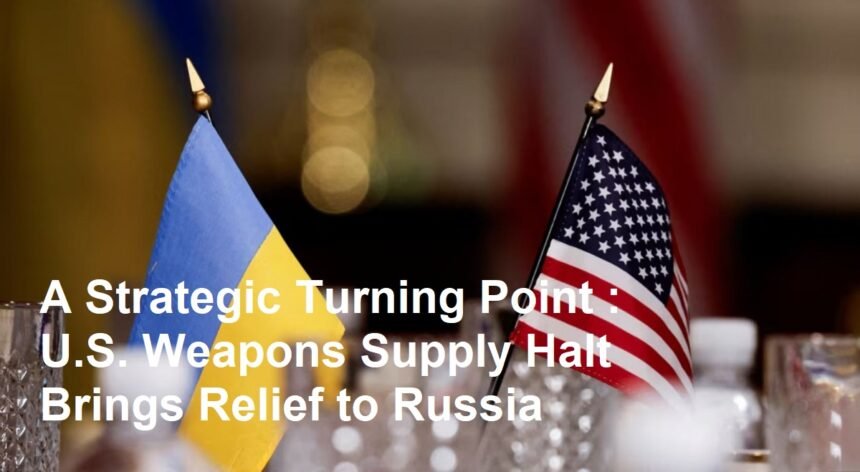Introduction
In a dramatic shift within the ongoing conflict between Russia and Ukraine, the United States has officially halted the supply of key weaponry to Ukraine—a move that many analysts view as a significant boost for Russia. This development reverberates well beyond the battlefields, signaling potential changes in the dynamics of the war and eliciting reactions from policymakers, military strategists, and the broader international community.
The Context Behind the Decision
For over two years, U.S. military support has been a lifeline for Ukrainian defense forces. High-precision artillery, advanced missile systems, and essential armored vehicles supplied by America have enabled Ukraine to mount strong resistance against Russian advances. The sudden cessation of this crucial aid, reportedly due to internal political gridlock in Washington as well as concerns about long-term sustainability, has caught Kyiv and its allies off guard.
Officials within the U.S. administration cite multiple reasons for this pause. Increasing partisan disagreements over military budgets, public fatigue regarding foreign interventions, and shifting geopolitical priorities are among the main explanations. Despite ongoing diplomatic discussions, fresh legislation to greenlight further military assistance remains stalled in Congress.
How Russia Gains Strategic Breathing Room
Moscow has quickly recognized the advantages presented by this new reality. Without the steady inflow of U.S.-supplied heavy weaponry, Ukrainian forces are pressured to stretch their resources thin, facing daunting logistical challenges and a reduced capacity to defend or reclaim territory. Russian military officials have interpreted America’s move as validation of their long-term resilience strategy, while Kremlin spokespeople publicly hailed it as a welcome sign of waning Western unity.
This situation also impacts Russia’s strategy on the ground. With less frequent arrivals of advanced Western arms at the frontlines, Russian troops face diminished threats from technologically superior munitions. This may embolden them to intensify operations or attempt to capitalize on Ukrainian vulnerabilities in contested regions such as the Donbas and Zaporizhzhia.
Reactions on the International Stage
Across Europe, NATO members and other Western supporters of Ukraine have expressed concern about the consequences of a prolonged halt in U.S. military supplies. Some countries, notably the United Kingdom and Poland, have vowed to step up their own shipments of equipment, though few possess the capacity to fully replace the scale and sophistication of American aid.
Ukrainian President Volodymyr Zelensky has made urgent appeals to allied governments, warning that gaps in the defense supply chain could turn the tide of the conflict. On the home front, Ukraine has begun accelerating efforts to domestically produce more ammunition and hardware, but scaling up in time to offset American shortfalls remains a daunting challenge.
Broader Implications for the Balance of Power
For Russia, the sense of relief is palpable. The halt places less strain on Russian logistics and may free up resources for other strategic aims, both inside and outside Ukraine. The Kremlin is likely to leverage this momentum diplomatically, seeking to persuade fence-sitting countries that Western backing of Kyiv is faltering, and to rally domestic support by framing the pause as proof of Russia’s endurance.
Meanwhile, the U.S. decision exposes the fragility of coalition efforts and brings into question the sustainability of international military assistance during prolonged conflicts. If Washington does not resume supplies, Russia could solidify gains and potentially negotiate from a position of greater strength. However, Western partners caution that unchecked Russian advances may have destabilizing effects that ripple far beyond the region.
Looking Ahead: Uncertainties and Risks
As the situation unfolds, much depends on whether diplomatic channels can restart, and if American lawmakers will find consensus on further aid packages. The U.S. pause may only be temporary, but its impact is immediate. Both Kyiv and Moscow are recalibrating their strategies in real time, acutely aware that pauses in international support can dramatically influence outcomes on the ground.
In summary, the U.S. halt to major weapons shipments marks a critical juncture, offering a rare moment of breathing space for Russia. But this development also signals deeper questions about the future of Western alliances and the shape of Europe’s security order for years to come.












